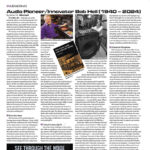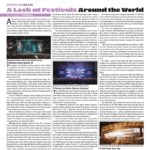Last month we talked about a lot of things in our rapidly changing world of digital audio, one of which was copy protection of audio software. Copy protection has long been a problem for companies that manufacture all sorts of software. Several years ago I had a conversation with a rep at an AES who told me that his company's program had approximately 1,000 registered purchases but an estimated 30 times as many users with illegitimate copies of their program. That's a lot of lost revenue due to cracked code, and it's totally unfair to folks who are trying to stay afloat developing software. If you really like using a program, and you'd like to see its continued support, ante up just as you would for a piece of hardware. Now I'll get off my software-soapbox and get on with it. In last month's Bleeding Edge, I gave you a super-quick rundown of a device known as an iLok. Let's take a look at the iLok in a bit more detail, because anyone who plans to own a Digidesign VENUE will need to know about this, as will any of you working in the studio using recording software. You may also run into the iLok on the road in situations where band members are using virtual synths or samplers on stage.
Manufactured by PACE Anti-Piracy, iLok is a device that facilitates software copy protection. PACE does not produce audio software; they simply have developed a lock and key for protecting software. iLok use is not limited to audio software, and you can simultaneously have authorizations on a single iLok for various applications (video editing, for example). One iLok can hold as many as 100 keys for software running on either Mac OS or Windows platforms.
You can think of the iLok much like the safe deposit box in your local bank. The bank (PACE) provides the lock and key (iLok) to protect the contents of your safe deposit box (software). Your account allows you to deposit and transfer software licenses (your investment) just like you might place your Telefunken 251 in a safe deposit box before going on vacation (better yet, leave it with me). PACE makes their technology available to software manufacturers who wish to protect their R&D investment, and to users who wish to use said software. In addition to developing the protection software, PACE provides drivers for users of iLok-protected software, and manufactures the physical device required to unlock a protected program. Current audio software manufacturers using iLok technology include: Antares, Bomb Factory, Crane Song, Digidesign, DUY, Eventide, GRM Tools, Line6, McDSP, Mark of the Unicorn (MOTU), Princeton Digital, Serato, Sonic Solutions, Sony, SoundToys, Steinberg, TC Works, Trillium Lane Labs, Unique Recording Software, WAVE Mechanics and WAVES. The iLok looks a lot like one of those small, solid-state USB "thumb drives" that plug directly into an open slot in your computer. It's small enough to fit in your pocket, but not so small that you're likely to lose it (I keep mine tethered to a baseball bat).
You can purchase an iLok for around $40 at iLok.com, as well as from audio software manufacturers and computer suppliers. Either way it's the same device, the exception being an iLok that comes packaged with software bundles — in which case the manufacturer may include a "pre-loaded" iLok (i.e., an iLok that includes authorizations for their software).
After you purchase iLok-compliant software and install it on your computer you typically have a week to 10 days during which the software will run without authorization. After that period of time the app will no longer open unless you insert an iLok with the appropriate license.
There are basically two ways to obtain the license for the software. In cases where you purchased a retail package, a license card may be included with the packaging. On this "Smart Card" is a small chip employing technology similar to that used for GSM cell phones and credit cards. Your software will prompt you to insert the license chip into the iLok; the license will move to the iLok, and your software will immediately be authorized. The other manner in which a license is obtained is through PACE's website (www. iLok.com), where you set up a private account with a password. This account is free of charge. When you purchase software via download, you register with the manufacturer and submit your iLok account name (which you must provide accurately to ensure that your deposit does not go into someone else's account). The manufacturer deposits an authorization "key" into your account, and sends you an e-mail when the deposit has been made. You log into your iLok account, and transfer the key from the web account to the iLok. Honestly, it sounds way more painful than it is in practice.
Using an iLok provides several advantages. Obviously you have the ability to carry all of your software authorizations in a single device that fits in your pocket. The keys are not located on a hard drive, so in the event of a hard drive crash you don't lose your software licenses. Your account can service more than one iLok, and licenses can be transferred between iLoks — though if you transfer a key to another user, there is an "administrative" fee of $25. Once you set up your account, you can name and identify your iLok(s), and view the licenses that they hold. When you add an authorization via license card, it's wise to re-register the iLok so that iLok.com can track your assets via a "synchronize" function. As I mentioned last month, iLok makes it easy to keep Internet software off of your audio computer, which is generally a wise idea. Finally, PACE offers a "Zero Downtime" insurance policy in case your iLok is broken, lost or stolen. At a cost of $30 per year/per iLok, this service provides immediate replacement of a missing iLok–which could save your arse on a show night.



